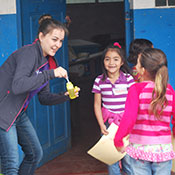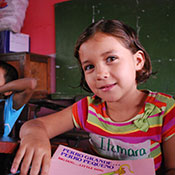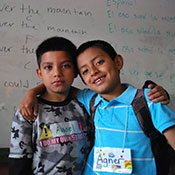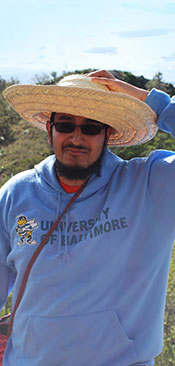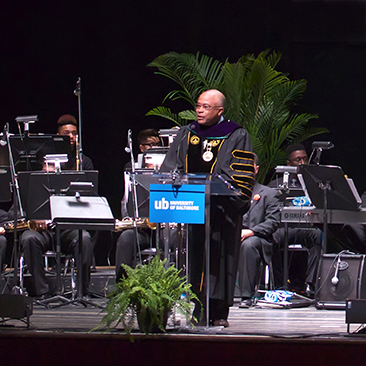A Mango Tree in Nicaragua
Category: Features
When people think about study abroad, they may think first of France or Italy. But I like to challenge myself, take risks and explore. I have learned that this fosters creativity, confidence and better learning. I also have a profound affinity for traveling, and I wanted other UB students to have an opportunity to travel, too; I think it helps people to see things as they are and not as how they think they might be. So I proposed a service-learning trip to Nicaragua for UB students.
I had previously traveled to Nicaragua on a service trip with Outreach360, an Arizona-based organization that focuses on education and community health in disadvantaged communities. I taught English and literacy to underprivileged children in the town of Jinotega, and it was a life-changing experience. I wanted other UB students to have similar experiences.
With the support of UB’s Helen P. Denit Honors Program and the mentorship of Kelly McPhee, B.A. ’08, M.A. ’11, the program’s manager, I planned a rigorous service-learning trip for Denit scholars to Nicaragua. Not only did the honors program assist us in preparing for a successful trip, it also provided all five participating students with Denit Service Abroad Adventure Awards to help cover program fees, so we had to pay only for our own airline tickets and travel insurance. After months of planning, coordinating with students and getting approval from faculty advisers and then weeks of pre-trip meetings, the idea finally became a reality.
In January, Elizaveta Nikonorova, an undergraduate business administration student in the honors program, and I led three undergraduate Denit scholars—David Sebastiao, a government and public policy student; Paxton Tibbins, a freshman; and George Zelenka Jr., a forensic studies student—on a trip back to Jinotega, again with Outreach360. We spent a week immersed in Nicaraguan culture to step out of our comfort zone.
Clifton Fadiman, an American author and media personality, once said, “When you travel, remember that a foreign country is not designed to make you comfortable. It is designed to make its own people comfortable.” Our entire trip was designed to encourage students to adapt to new situations, prepare for challenges and adopt a spirit of adventure.
We joined about 40 other college students, also participating in service learning through Outreach360, and we all stayed at the organization’s guest house and ate our meals (covered in the program fees) at El Tico restaurant, a half-mile from the house.
The first day brought an intense orientation at the volunteer center and tours of both the organization’s learning center, where volunteers teach local children, and Jinotega. We also had a chance to attend Sunday Mass at Catedral San Juan de Jinotega.
From Monday to Thursday, we participated in a learning camp for city students. During camp, we worked with about 120 local children daily, and our group led story time and drama; each day, we read a book such as The Princess and the Frog in Spanish and in English and then acted out the story. Our students treated us, their teachers, with the utmost respect and clearly had a burning desire for learning. On the last day, all the schoolchildren with whom we worked signed their names and drew their impressions of Eubie [the University of Baltimore’s mascot] on a thank-you banner for UB President Kurt L. Schmoke.
When we weren’t with the children, like during siesta time, we learned about Nicaraguan history, culture and geography. In the evenings, we attended screenings of documentaries that helped us understand the country’s social and cultural issues.
We also did a lot of walking—30 miles in seven days. We climbed about 900 steps to Peña de la Cruz, a hill in Jinotega from which we saw the majestic beauty of the city from above. In the evening, we went to Sopexxco Coffee Co-op, where we saw firsthand how coffee is tasted and graded. Another excursion took us to a local pottery co-op run by 11 women and to Selva Negra, a sustainable coffee estate and ecolodge where they grow coffee in innovative ways.
Before we left, we planted a mango tree on behalf of the University of Baltimore. The idea is that we planted a seed by making a difference in the lives of the people of Jinotega, and one day—poco a poco—the support from volunteers like us will bear fruit.
Adnan Hameed, B.S. ’14, is a student in the graduate Negotiations and Conflict Management program.
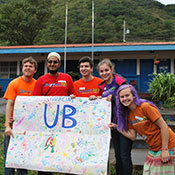
thank-you banner for Schmoke
l. to r.: Zelenka, Hameed, Sebastiao, Nikonorova and Tibbins showing off the thank-you banner that local students created for Schmoke; all photos courtesy of Adnan Hameed
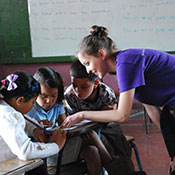
helping students read
Nikonorova helping students read Perro Grande … Perro Pequeño/Big Dog … Little Dog in class
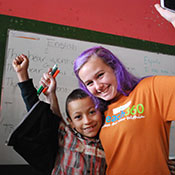
a local student and Tibbins
a local student and Tibbins celebrating after singing “The Bear Went Over the Mountain”
